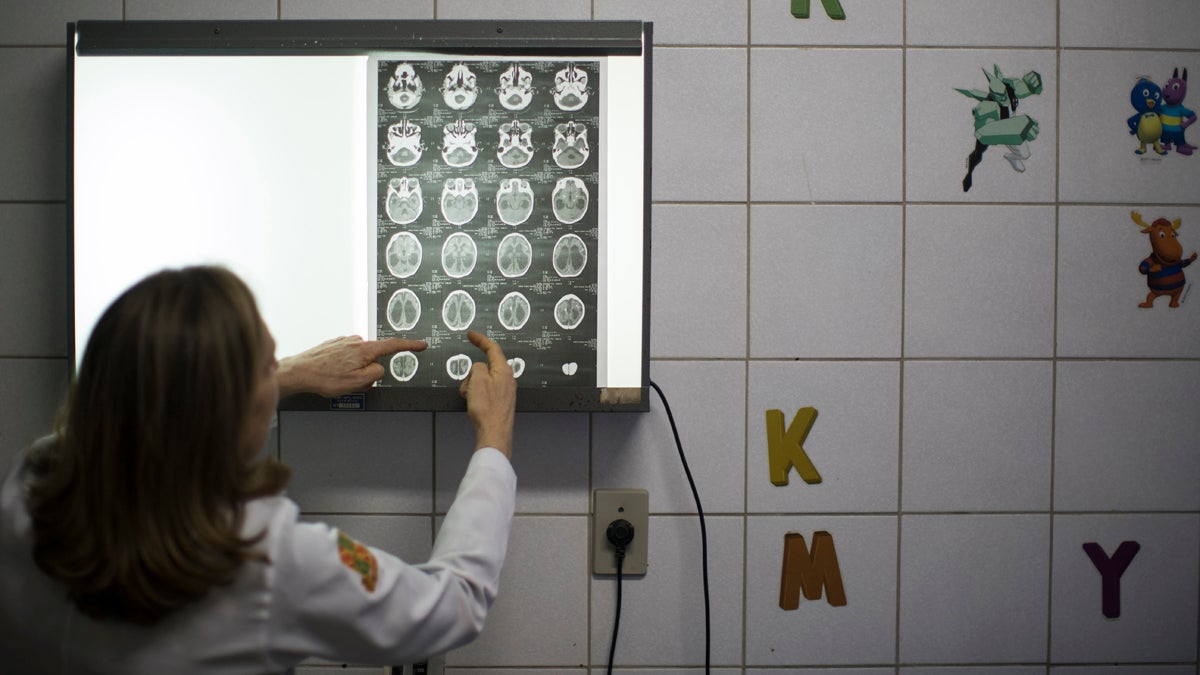Risk of Zika virus causing some in Philly region to rethink travel plans

Dr. Angela Rocha shows brain scans of a baby born with microcephaly at the Oswaldo Cruz Hospital in Recife, Brazil. Brazilian officials still say they believe there's a sharp increase in cases of microcephaly and strongly suspect the Zika virus, which first appeared in the country last year, is to blame. The concern is strong enough that the U.S. Centers for Disease Control and Prevention this month warned pregnant women to reconsider visits to areas where Zika is present. (Felipe Dana/AP Photo)
The big health threat is more than a thousand miles away in South and Central America and the Caribbean, but the Zika virus is upending plans for some in the Philadelphia region.
City resident Michelle Weir is eight months pregnant with her first child. In mid-January, she’d planned to have her feet in the sand in Tulum, Mexico.
“It was supposed to be our ‘babymoon,’ my husband and I had actually gotten married in Mexico about a year before, so we were looking forward to returning,” Weir said.
With just 12 hours until their flight was set to leave, the couple — both physicians — did a little research and cancelled the trip.
They were heeding the advice of the Centers for Disease Control and Prevention, which recommends that pregnant women postpone travel to Brazil, Haiti, Ecuador and other countries affected by the mosquito-borne Zika virus.
The virus can pass through amniotic fluid and has been associated — especially in Brazil — with an unusual rate of babies born with small heads as well as brain and developmental problems.
“Since there wasn’t enough information out there, the risk is just not worth it,” said Weir.
“Right now the best prevention is to not go, if you are one of these individuals who is pregnant or planning to become pregnant,” said Paul Sax, clinical director the division of infectious disease at Brigham and Women’s Hospital in Boston.
It’s not clear when the risk to a fetus is greatest.
“Pretty much the rule for congenital infections like this [is] earlier phases of pregnancy are worse,” Sax said. “We don’t absolutely know when the Zika infection occurs and, really, to be humble about it a minute, we’re not even totally sure that Zika virus is the cause of this problem, although it probably is.”
“If travel cannot be avoided, we strongly recommend that women take preventive measures including wearing long sleeves and long pants, using approved mosquito repellents and avoiding exposure — as best possible — to insect bites,” said Harold Wiesenfeld, an obstetrician gynecologist at the University of Pittsburgh Medical Center where he directs the division of reproductive infectious disease and immunology.
For pregnant women who are returning to the United States after visiting Zika-affected countries, the CDC recommends that they let a care provider know about recent travel.
“If they have any symptoms — such as fever, rash, muscle aches — they should undergo testing for the virus,” Wiesenfeld said.
For women with no symptoms who are just back in the country, health officials suggest an imaging test.
“It is recommended that she undergo an ultrasound to look for any evidence in the baby of Zika virus infection, that is, changes in the brain of the fetus,” Wiesenfeld said.
If that first ultrasound is normal, follow-up screenings may help an obstetrician monitor changes in the baby.
A postscript: Philadelphia mom-to-be Michelle Weir and her husband are expecting a daughter. It turns out they did get that pre-baby vacation — they opted for New Orleans instead of Mexico.
WHYY is your source for fact-based, in-depth journalism and information. As a nonprofit organization, we rely on financial support from readers like you. Please give today.

